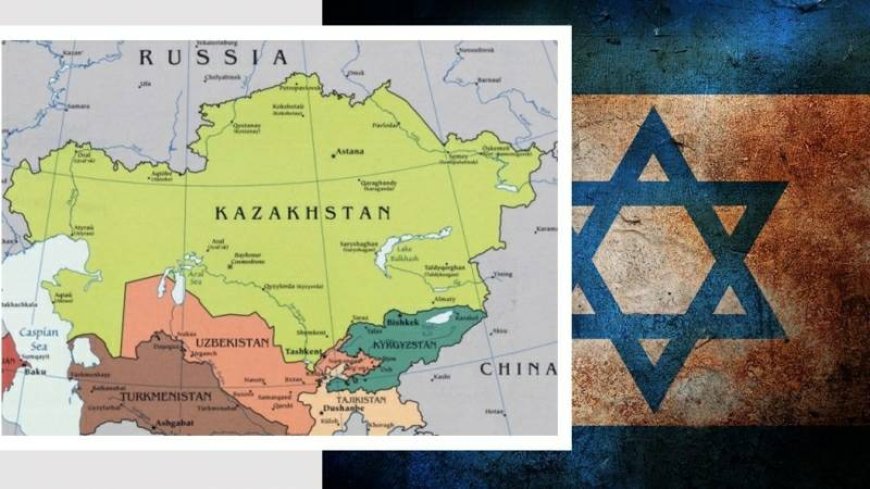Central Asia: The new battleground for the Zionist regime's anti-Iran policies
In recent months, there has been a notable escalation in regional and global affairs, resulting in significant shifts in the geopolitical landscape of the world. The West Asian region, considered a crucial area of the globe, has remained in close proximity to these developments. These include the bolstering of the Axis of Resistance, spearheaded by Iran, which has emerged as a pivotal and influential player in the political dynamics following the unsuccessful efforts of the Hebrew-Arab-Western coalition to partition Syria through the deployment of extremist terrorists. Additionally, the past year has witnessed a gradual downsizing of the US military footprint in the region, while Iran's bid for isolation has been foiled by the rapprochement between Saudi Arabia and the Islamic Republic of Iran.

In the meantime, the Zionist regime has kept a careful eye on the unfolding events. Tel Aviv, which currently finds itself in a challenging predicament in the wake of the failure of Iran's isolation strategy following the détente between Iran and Arab nations as well as the collapse of the proposed Hebrew-Arab-NATO alliance, is in search of a new battleground to confront Tehran. Tel Aviv's latest strategy includes exploring new anti-Iran prospects in Central Asia.
In general, the presence of Zionists in the Central Asia region is motivated by the following objectives:
A. Central Asia is endowed with an abundance of natural resources.
B. Containing Iran through infiltrating Central Asia's Islamic countries
C. Luring immigrants, including Jewish communities, to settle in the occupied Palestinian territories
A) Central Asia has proven its resilient capacity to overcome challenges such as growing demography, hydrological disputes among its states, and a wide range of border conflicts to emerge as one of the most serene regions on the globe. Also, the vast oil and natural gas resources of Central Asia should be considered a pivotal factor in upholding stability in the global energy markets. When we look at the oil reserves of Central Asian nations, we see that Kazakhstan leads the pack with a whopping 78.5 billion barrels. The Republic of Azerbaijan comes in second with 18.3 billion barrels, while Turkmenistan and Uzbekistan trail behind with 1.6 billion barrels each.
Furthermore, the Central Asian region boasts a significant share of natural gas reserves, with Turkmenistan leading the list with an impressive 83.2 trillion cubic metres. Kazakhstan, Uzbekistan, and the Republic of Azerbaijan also hold notable shares of 7, 5.1, and 4.7 trillion cubic metres, respectively. Over the course of the past two decades, the Central Asian region has experienced the unearthing of large deposits of oil and natural gas. In addition, it is worth noting that the region boasts an important supply of coal and uranium resources among its other natural resources. It becomes apparent that the Zionist regime, with its small geographical mass and corresponding limited natural resources, would greatly benefit from investing in the rich resources of Central Asia to bolster its precarious economic situation.
B) The Zionist regime, given its vulnerable geostrategic environment in West Asia, has consistently endeavoured to expand its reach beyond the neighbouring Arab nations. The Zionist regime finds itself encircled by hostile Arab nations. According to the 'Periphery Doctrine' of Ben-Gurin, Zionist policymakers have consistently strived to widen their political influence across the globe. The establishment of diplomatic relations with Central Asian governments may potentially offer a breathing space for the Zionist regime. Given that the Central Asian nations adhere to Islam, the presence of the Zionist regime within their borders can confer some legitimacy on its existence. Moreover, over the past two decades, there have been concerted efforts to establish a foothold in neighbouring nations surrounding Iran.
This phenomenon has been particularly noticeable in the Republic of Azerbaijan, Iraq's autonomous Kurdistan region, and the littoral shikhdoms of the Persian Gulf. Turkmenistan, situated in Iran's east and northeast with relatively secure borders with Iran, is among the Islamic nations that Tel Aviv aims to infiltrate. The Zionists have encountered opposition from Turkmen officials in the past, with reports indicating that the Turkmenistan government declined to accept the ambassadorial credentials of the Zionist envoy. The development regarding the confirmation of Haim Koren's ambassadorship in Turkmenistan has sparked controversy. Despite the Zionist regime's persistent efforts to secure Koren's appointment, a high-ranking official in Turkmenistan has unequivocally stated his opposition to his credentials.
The Turkmen official cited concerns about espionage activities by Koren against Iran as the reason for Ashgabat's stance. As reported by the Hebrew daily Haaretz, the Turkmen authorities have deemed Koren's status as a diplomat to be questionable, given his past employment at the Guillot security academy for a period of three years. This has led to suspicions that Koren may have been operating as a spy rather than a diplomat. The ongoing insecurity along the borders of Iran and Afghanistan has fueled concerns about potential geopolitical implications.
Some experts suggest that this situation has presented a unique opportunity for the Zionist regime to pursue its long-term agenda of destabilising Iran. Also, it is imperative to highlight the Iranophobia project that has been pursued in the Central Asia region. This project has been launched with the aim of fulfilling the objectives of the Zionists in the region, and its impact is being felt today in the Caucasus region, particularly in the Republic of Azerbaijan.
C) The Zionist regime, as a fake state, has always needed to build a nation through attracting immigrants and introduce them as true native citizens and carry out the process of Judaization of occupied Palestine and clean up the traces of Muslim Arabs. One important source of immigrants to the occupied territories is the Central Asia.













































